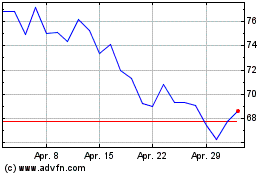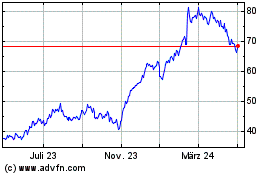California Voters Exempt Uber, Lyft, DoorDash From Having to Reclassify Drivers
04 November 2020 - 9:21AM
Dow Jones News
By Preetika Rana
Uber Technologies Inc., Lyft Inc. and DoorDash Inc. won a
pivotal vote in California that exempts them from having to
reclassify their drivers as employees, according to Associated
Press race calls.
The companies, along with Postmates Inc. and Instacart Inc.,
collectively contributed around $200 million to support Proposition
22, a measure that allows them to bypass a state law intended to
provide employee-like protections for their drivers. The campaign
was the most expensive for any ballot measure in state history.
With more than 60% of ballots counted, the vote was running 58% in
favor of the measure and 42% against, prompting the Associated
Press to project it would pass.
The outcome deals a blow to the state government, which has been
embroiled in a high-stakes battle with the companies over the
reclassification. A law passed last year sought to force ride-share
and food-delivery companies to reclassify their drivers as
employees, eligible for benefits such as minimum wage, paid sick
leave and unemployment assistance.
The app companies' business models are predicated on "gig
workers" -- independent contractors -- to keep labor costs low.
None of the companies reclassified workers after the law went
into effect on Jan. 1. Instead, they combined forces to support the
ballot measure. The state sued in May to enforce the statute,
litigation that will be superseded by the successful election
outcome.
The stakes were high for the companies: A reclassification would
have weighed on their already-red bottom lines and set a precedent
for other U.S. states challenging their business model.
In recent months, the ride-share and delivery companies blasted
ads and push notifications to drivers, saying only a fraction of
them would be hired as employees. Fewer drivers would mean longer
wait times, they said in messages to customers, and prices would
rise because of higher costs associated with the reclassification.
Uber Chief Executive Dara Khosrowshahi estimated that prices for
rides could double if the ballot measure failed.
The California law at the heart of the dispute didn't restrict
flexible work; lawmakers say the companies were free to structure a
model where benefits and flexibility went hand-in-hand.
The companies argued it was unrealistic to extend employee-like
benefits to many drivers who worked for them just a few hours a
week. They also said the reclassification would force drivers to
work pre-scheduled shifts, robbing them of the freedom they
currently enjoy. More than half a dozen drivers interviewed said
they planned to vote in the companies' favor because that messaging
resonated with them.
To make their ballot measure more palatable, the companies said
that if it passed they would guarantee some new protections,
including health insurance for drivers who work at least 15 hours a
week, occupational-accident insurance coverage and 30 cents for
every mile driven. Opponents of the measure said those benefits
fall short of those awarded to full-time employees.
The ballot measure can be amended only with a seven-eighths
majority of both houses of the state legislature, a threshold
unprecedented in previous voter-passed laws in California.
Write to Preetika Rana at preetika.rana@wsj.com
(END) Dow Jones Newswires
November 04, 2020 03:06 ET (08:06 GMT)
Copyright (c) 2020 Dow Jones & Company, Inc.
Uber Technologies (NYSE:UBER)
Historical Stock Chart
Von Mär 2024 bis Apr 2024

Uber Technologies (NYSE:UBER)
Historical Stock Chart
Von Apr 2023 bis Apr 2024
